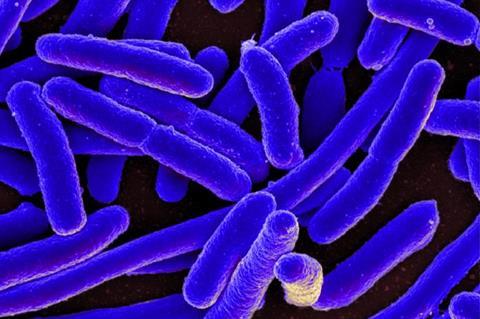An international team of scientists has now engineered the first published CRISPR-based candidate for a drug that targets E. coli directly and leaves the microbiome intact.

Blood cancer patients being treated for a E coli infection face the risk that the bacteria will travel into the bloodstream. In those cases, an E. coli infection is too often fatal, with a mortality rate of 15-20%.
The predominant cure for such infections is the use of antibiotics that have detrimental effects on the patient’s microbiome, which play a key part in our physical and emotional well-being, and other side effects. Furthermore, growing problems with antibiotic resistance render such treatments less effective in treating infections.
A new paper in Nature Biotechnology titled ‘Engineered phage with antibacterial CRISPR–Cas selectively reduce E. coli burden in mice’ describes the development of the new drug candidate to a stage where it is ready for tests on humans.
Through extensive use of synthetic biology, the team designed four bacterial viruses that use CRISPR technology to kill the unwanted bacteria precisely.
Narrow spectrum drug
“We believe that a narrow spectrum drug with these properties could be very useful to cancer patients, among others, who often get serious infections that are difficult to treat with current antibiotics,” says Morten Otto Alexander Sommer, a professor at DTU Biosustain, Co-founder of SNIPR Biome, and lead author of the paper.
The work was carried out in collaboration with JAFRAL (Slovenia), JMI Laboratories (US), and Division of Infectuous Diseases at Weill Cornell Medicine (US).
The team, primarily based at SNIPR Biome, screened a library of 162 naturally occurring phages. They found that eight of these phages showed promise in targeting E. coli. They then engineered the phages through gene editing to improve their ability to target E. coli.
A cocktail of four of these phages, which they named SNIPR001, very effectively targeted bacteria in biofilms and reduced the number of E. coli in a manner that surpassed that of naturally occurring phages. Further, they showed that the cocktail of phages was tolerated well in the gut of mice and mini pigs while reducing the emergence of E. coli. SNIPR001 is now in clinical development and has been granted a Fast-Track designation (expedited review) by the US Food and Drug Administration.
Patients at risk
The reason this new development is exciting for blood cancer patients has to do with side effects stemming from their chemotherapy treatment. It causes the patient’s bone marrow to produce fewer blood cells and inflammation of the intestines. The latter increases the intestine’s permeability allowing bacteria from the gut to travel into the bloodstream. This combination of side effects leaves the patient vulnerable to infections from bacteria like E. coli.
Today, patients at risk (i.e., with low levels of white blood cells) receive antibiotic treatments ahead of their chemotherapy, but in some cases, E. coli shows very high resistance to commonly used antibiotics. Also, the antibiotics themselves have several side effects that in some cases reduce the effect of the cancer treatments.
“We need a wider variety of options available to treat these patients, preferably ones where we can specifically target the bacteria responsible to avoid side effects and that do not add to the problem of antibiotic resistance,” says Morten Otto Alexander Sommer.
In recent years, researchers have been looking towards using phages to treat infections because of the increase in antibiotic resistance. Before antibiotics were broadly available, phages were widely used and studied in countries that were then part of the Soviet Union. However, there are few clinical trials, and the results haven’t been convincing, according to the paper.
“Through emerging technologies like CRISPR, the use of phages in treating infections has become a viable pathway. As our results show, there is potential for enhancing naturally occurring phages through genetic engineering. It is my hope that this approach may also serve as a blueprint for new antimicrobials targeting resistant pathogens,” says Morten Otto Alexander Sommer.







No comments yet